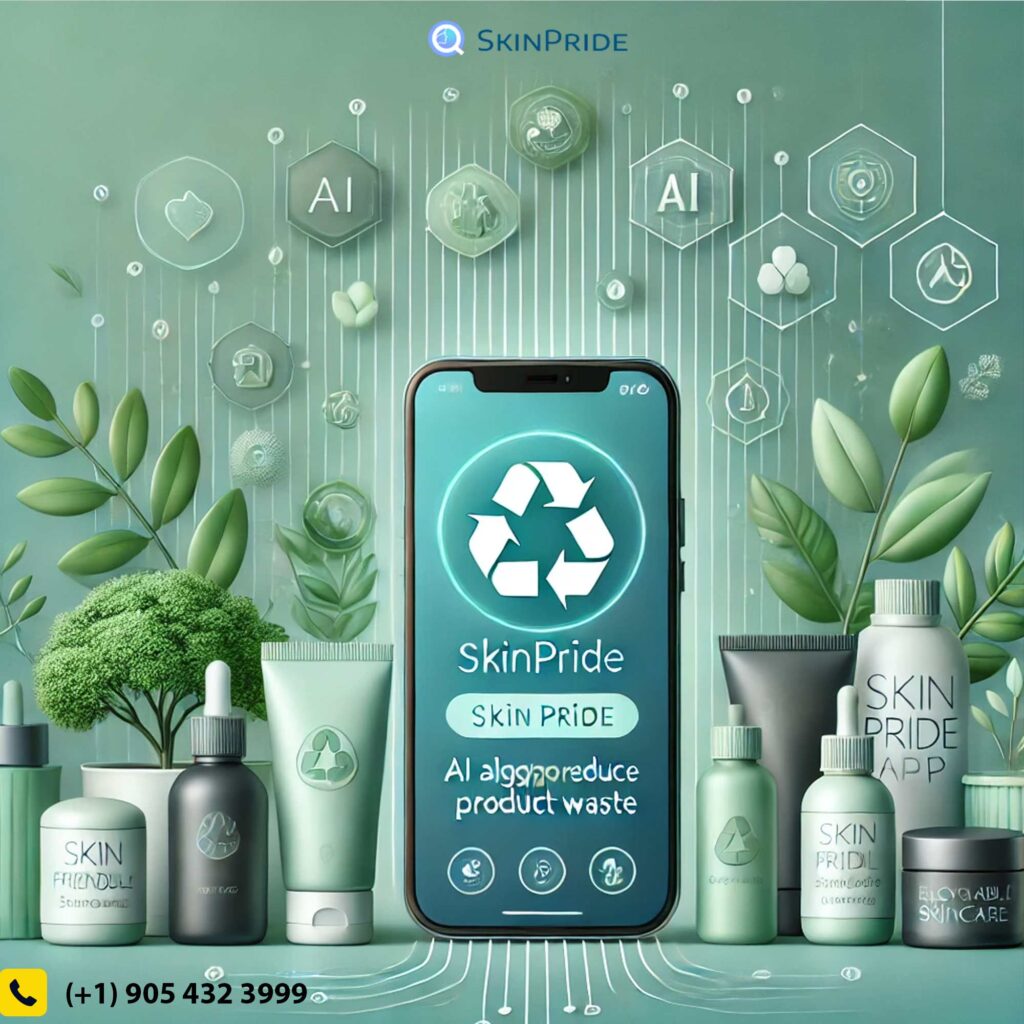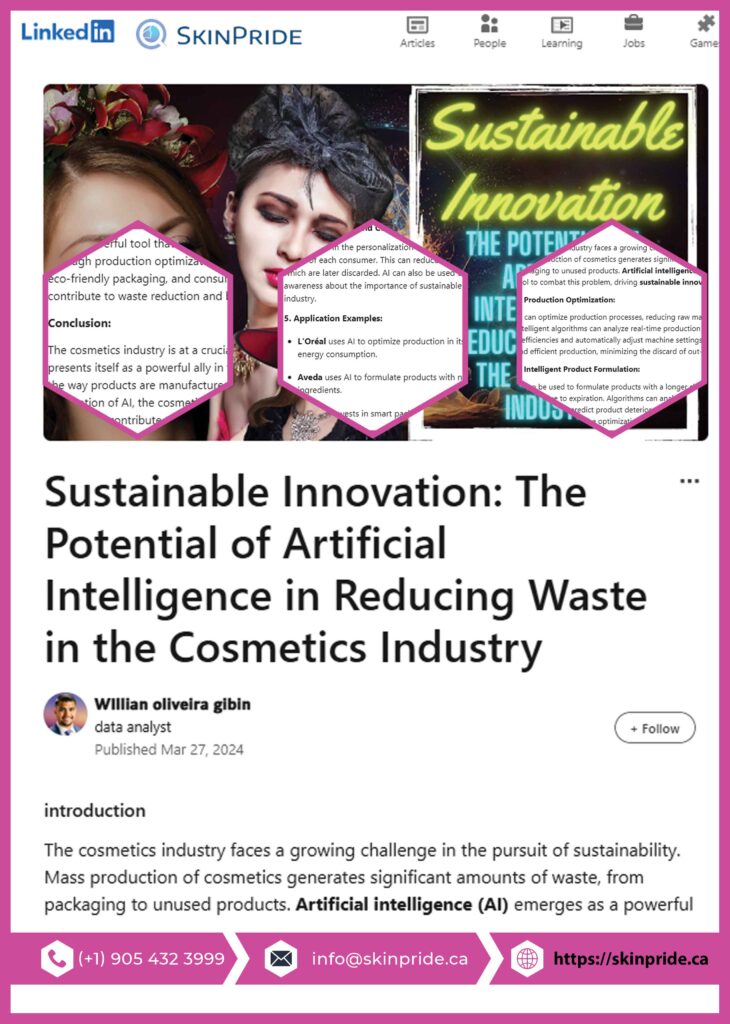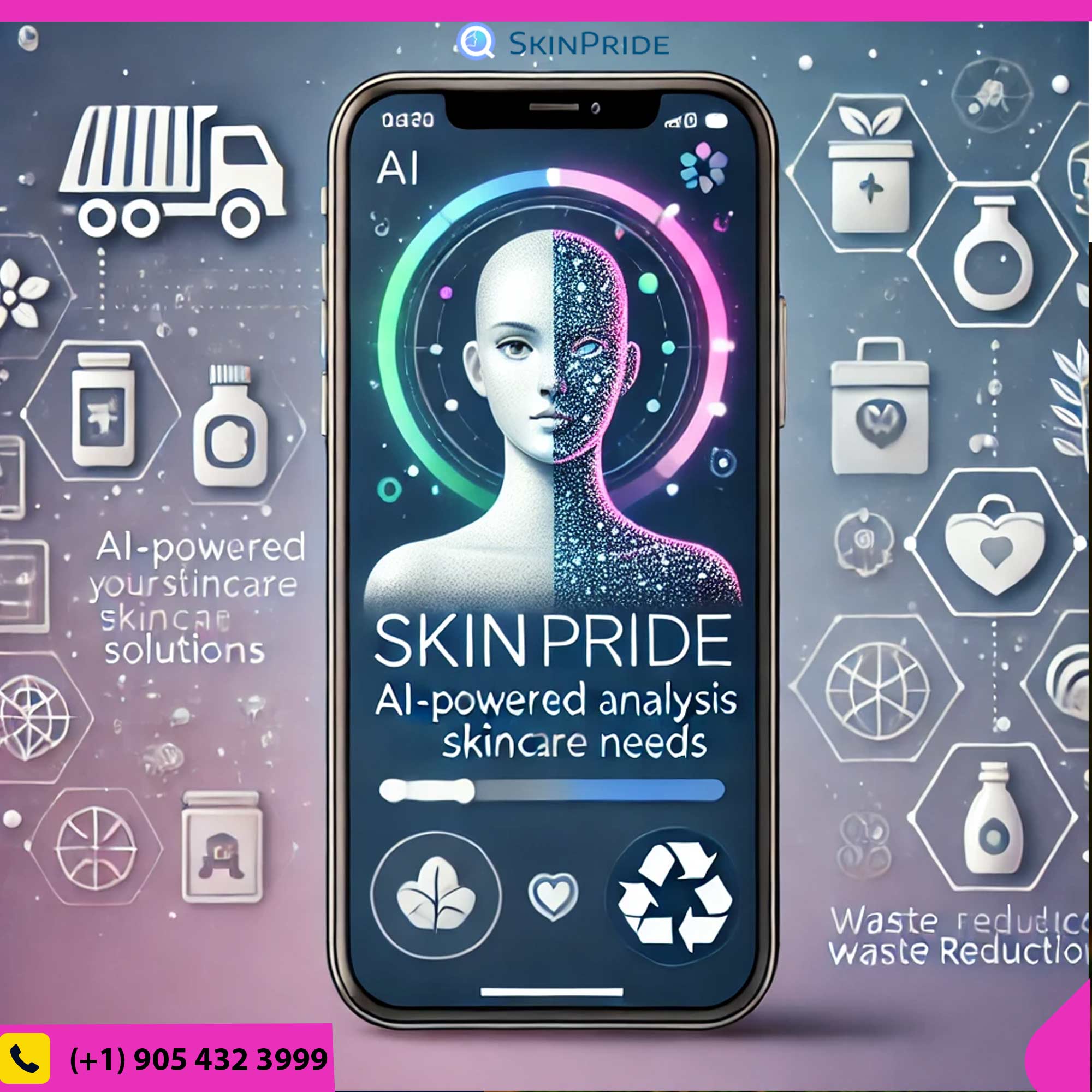Sustainability in Skincare: How AI Reduces Waste in Beauty Products | SkinPride App
Introduction
In the ever-evolving beauty industry, consumers are increasingly seeking sustainable solutions, both for their skin and the planet. One such solution is Artificial Intelligence (AI), which plays a pivotal role in tailoring skincare products to meet individual needs, ultimately reducing waste in beauty products. Through machine learning and skin analysis apps like SkinPride, AI is not only enhancing skincare outcomes but also significantly minimizing unnecessary purchases and lowering the environmental impact of the beauty industry.
The beauty industry, particularly skincare, has long been under scrutiny for its impact on the environment. With excessive packaging, unnecessary ingredients, and the overproduction of products, the industry has contributed significantly to waste. However, sustainability has become a major focus in recent years, and technology, especially AI in skincare, is now playing a vital role in reducing this waste.
AI offers innovative solutions by customizing skincare products to suit individual needs, cutting down on unnecessary purchases, and ensuring that consumers receive products that align with their specific skin concerns. This not only improves user experience but also reduces the environmental impact. The SkinPride App, with its AI-powered skin analysis and personalized recommendations, is a prime example of how AI is revolutionizing sustainability in beauty.
This article explores the transformative power of AI in skincare, particularly in how it addresses the challenges of over-consumption and excess packaging. We’ll delve into how AI is helping consumers make more informed choices, creating a more sustainable beauty industry. Additionally, we’ll examine how the SkinPride app is at the forefront of this innovation, offering tailored skincare recommendations that contribute to a greener, more sustainable future.
Understanding the Problem: Waste in the Beauty Industry
The beauty industry is one of the largest contributors to environmental waste, with overproduction and packaging being major culprits. According to studies, approximately 120 billion units of packaging are produced each year in the beauty sector, much of which is single-use and non-recyclable. This has led to a substantial environmental impact, contributing to pollution and the depletion of natural resources.
One of the reasons for this overproduction is the lack of personalization in products. Consumers often purchase products that don’t suit their skin, leading to wasted products and discarded packaging. The traditional method of mass-producing beauty products, based on generalized assumptions, doesn’t account for individual needs, resulting in unsold inventory and waste.
AI-powered skincare apps like SkinPride leverage advanced algorithms and machine learning to analyze users’ skin and recommend personalized products. These products are based on individual skin types, concerns, and preferences, making it easier for consumers to purchase only what they need, avoiding impulse buys and reducing waste.
- Skin analysis: Through the use of image recognition technology, the app can detect skin conditions such as acne, wrinkles, or sun damage, and suggest targeted treatments. This precise diagnosis leads to the selection of skincare products that truly benefit the user.
- Data-driven decisions: AI uses consumer data to track user preferences and behavior, refining product suggestions over time. This continuous learning optimizes the customer experience, making sure they purchase only the most suitable products.
By eliminating the guesswork, AI-powered apps like SkinPride are driving smarter purchases that align with sustainability goals.
AI and the Reduction of Beauty Product Waste
Beauty product waste has been a growing concern, with many consumers purchasing products that may not suit their skin type, leading to unused products being discarded. AI helps to minimize this waste by offering recommendations that are more likely to meet the user’s specific needs.
- Tailored skincare recommendations: With the use of AI, consumers no longer need to buy a range of products to see what works for them. Instead, they can receive highly targeted suggestions for products that will deliver results, reducing the likelihood of products being thrown away.
- Sustainable packaging: By aligning AI with the circular economy, companies can design packaging that minimizes waste. Smart product packaging can be optimized based on the quantity required by the user, further reducing packaging waste in the beauty industry.
This shift towards smarter consumption and sustainable packaging is one of the key benefits of integrating AI into skincare.
AI has the potential to solve many of the waste-related issues in the beauty industry. Through AI-driven customization, skincare products can be tailored to meet the unique needs of individual consumers. AI algorithms analyze factors such as skin type, age, environmental factors, and personal preferences to recommend products that are most likely to provide the best results. This personalization minimizes the likelihood of purchasing products that won’t be used, which directly reduces waste.
Moreover, AI in skincare integrates data from various sources to predict the right products for each user. Instead of relying on traditional marketing strategies that promote generalized products, AI leverages advanced machine learning to suggest precisely what a user needs, ensuring that every product has a purpose.

Consumer Data Integration via AI
AI’s ability to analyze consumer data is another key factor in reducing waste in the beauty industry. The more data the AI collects, the more accurate its predictions become. By understanding the unique skin conditions, preferences, and shopping behaviors of each consumer, AI can:
- Track product usage: AI systems can monitor how much product a user applies, suggesting refills or replacements only when necessary.
- Predict skin trends: By analyzing historical data, AI can predict skin conditions and recommend future products, preventing unnecessary purchases of products that may no longer be needed.
- Educate consumers: Through data-driven insights, AI helps educate consumers on how to maximize the effectiveness of their skincare routine, making them more mindful of their purchases.
By effectively integrating consumer data, AI makes skincare purchases more thoughtful and aligned with sustainability goals.
AI in skincare goes beyond giving personalized product recommendations. Apps like SkinPride gather skin data, such as moisture levels and texture, to create a personalized profile. This helps reduce waste by suggesting products that suit the skin’s evolving needs. By tracking progress, AI adjusts suggestions over time, preventing unnecessary purchases and reducing impulse buying. This approach ensures consumers only buy products when truly needed, reducing clutter in their cabinets.
SkinPride App: Revolutionizing Beauty with AI
The SkinPride app uses AI to provide personalized skincare recommendations based on individual skin needs, lifestyle, and environment. Unlike traditional routines, it tailors suggestions to avoid wasteful purchases, focusing only on necessary products. The app also allows users to track skin improvements, ensuring the effectiveness of the recommendations. This approach promotes sustainable skincare and helps consumers make informed decisions that benefit both their skin health and the planet.
- Precise skin diagnosis: SkinPride’s algorithm scans photos of users’ skin lesions, determining whether there are signs of skin cancer or other skin conditions. The app then suggests the most suitable skincare products, ensuring that users don’t purchase products that they don’t need.
- Waste reduction: By offering personalized suggestions, the SkinPride app reduces the likelihood of users overbuying products, leading to a more sustainable consumption pattern.
- Eco-friendly impact: SkinPride also promotes environmentally friendly products, encouraging consumers to choose sustainable, cruelty-free options.
Through these features, SkinPride is helping consumers embrace a more sustainable and responsible approach to beauty.
Scientific Insights: The Role of AI in Cosmetic Dermatology
AI is revolutionizing cosmetic dermatology by enhancing skin condition diagnosis through image analysis. AI algorithms can detect issues like acne, pigmentation, and aging signs, providing precise product recommendations and reducing the risk of adverse reactions. This accuracy also helps consumers avoid unnecessary purchases, promoting both effective skincare and waste reduction. AI’s role in offering personalized skincare solutions contributes significantly to improved outcomes and sustainable beauty routines.
Skincare Devices and Apps Enhancing Sustainability
The rise of skincare apps and AI-powered devices is reshaping the beauty industry. These devices offer real-time skin analysis, allowing consumers to assess their skin condition at home. With features like AI-driven recommendations, users can receive tailored advice on which products to use and when to stop using them.
Many of these devices are designed to provide long-term solutions rather than short-term fixes, promoting the idea of sustainable beauty. By providing personalized routines and advanced skin diagnostics, these devices reduce the chances of over-purchasing and product waste, which is a win-win for both the consumer and the environment.
Consumer-Focused Skincare Apps and Devices
In 2024, consumer-focused AI skincare apps and smart skincare devices are gaining popularity, allowing users to receive personalized skincare recommendations based on their unique skin needs. Some of the most popular AI-powered skincare apps include SkinPride, which is revolutionizing how consumers approach skincare and sustainability.
The SkinPride app plays a pivotal role in this shift towards sustainable skincare. By leveraging advanced AI algorithms, the app provides users with highly personalized skincare routines based on their unique skin profiles. The app performs real-time skin analysis, identifying key skin concerns such as dryness, acne, and aging, then recommending products that are most effective for these specific needs. This not only ensures that users avoid unnecessary purchases of products that won’t work for their skin but also contributes to reducing the environmental impact caused by overproduction and excess packaging. With the SkinPride app, users can be more mindful of the products they use, fostering a more sustainable beauty routine.
For more scientific insight, here is a recent article from 2024 that further explores AI’s role in skincare:
AI is revolutionizing sustainability in the cosmetics industry by optimizing production, formulating products with longer shelf lives, and developing eco-friendly packaging. It helps reduce waste through personalized consumer products, minimizing unnecessary purchases. Brands like L’Oréal, Aveda, and Unilever are leading the way by implementing AI to reduce water, energy consumption, and promote biodegradable materials. Through these innovations, AI plays a crucial role in reducing the environmental footprint of the industry, contributing to a more sustainable future.

While AI is transforming sustainability in the cosmetics industry through production optimization, product formulation, and packaging, SkinPride takes a more personalized approach by using AI to analyze individual skin needs. By tailoring products specifically for users based on their unique skin profiles, SkinPride reduces unnecessary purchases and waste. This personalized approach not only aligns with sustainability goals but also enhances consumer experience by providing more accurate and effective skincare solutions. SkinPride is at the forefront of sustainable beauty through its use of AI-driven skin analysis.
The Environmental Impact of AI in Skincare
AI’s ability to recommend only the products necessary for each consumer has a significant positive environmental impact. By reducing the overproduction of beauty products and eliminating unnecessary packaging, AI-powered solutions help reduce carbon footprints and overall waste in the beauty industry.
Additionally, with AI helping to create sustainable and eco-friendly products, it is easier for consumers to make better purchasing decisions. For instance, they are more likely to choose brands that use recyclable packaging or eco-friendly materials, further contributing to sustainability.
The Future of AI in Sustainable Beauty
Looking forward, AI’s role in the beauty industry will evolve, enhancing the personalization of skincare and offering more precise recommendations. This shift promises improved skincare results while promoting sustainability by reducing waste. Additionally, AI integration will encourage the development of eco-friendly skincare technologies, aligning effective beauty routines with environmental consciousness. These advancements will make the beauty industry both more efficient and sustainable.
Challenges and Opportunities in AI Integration
While AI holds immense potential for sustainability in skincare, several challenges remain. The cost of implementing AI and consumer adoption are key barriers to widespread use. However, as technology becomes more affordable and accessible, these challenges are likely to diminish.
The opportunities, however, are endless. By continuing to innovate and integrate AI into skincare, brands have the chance to make a lasting impact on the industry, ensuring a more sustainable future for both consumers and the planet.
Conclusion
AI’s role in reducing waste in the skincare industry is undeniable. By personalizing products and using consumer data, AI helps minimize unnecessary purchases, thus reducing environmental impact. The SkinPride App is a perfect example of how AI is transforming the beauty industry, offering tailored skincare solutions that align with the consumer’s unique needs.
As AI continues to evolve, it is expected to play an even larger role in sustainable beauty, promoting eco-friendly practices and reducing waste while ensuring that consumers receive the best possible skincare.
FAQs on AI in Sustainable Skincare
AI reduces waste by offering tailored skincare recommendations, helping users purchase only what they need.
AI promotes sustainability by reducing product overproduction and packaging waste.
Yes, SkinPride promotes eco-friendly practices by suggesting sustainable products and reducing unnecessary product purchases.
Yes, AI provides accurate skin analysis, leading to better-targeted skincare products that deliver optimal results.
AI not only reduces waste but also helps improve skincare outcomes, making it easier for consumers to maintain healthy skin with minimal environmental impact.

